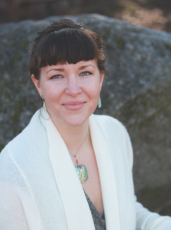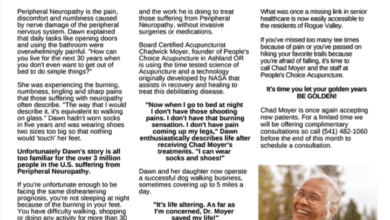Ashland Colon Hydrotherapy – Now Providing Nutrition And Stress Reduction Services For Digestive Health
 In today’s interview, I speak with Sarah West and Marilyn Lindsay about their expanded services for optimizing digestive health through nutrition and stress reduction.
In today’s interview, I speak with Sarah West and Marilyn Lindsay about their expanded services for optimizing digestive health through nutrition and stress reduction.
Sarah, last year we introduced Marilyn in joining you in partnership with Ashland Colon Hydrotherapy. How has the year gone for the two of you?
Our partnership has gone phenomenally well in serving the needs of people here in the Rogue Valley. Working together at the lovely Hidden Springs Wellness Center enhances the experience for people, and the practice has become even more well-rounded with the addition of Marilyn’s passion for health, as well as her expertise in nutrition.
Working with Marilyn is truly a joy. She is grounded and thoughtful, and her compassionate presence has been so valuable in deepening my commitment to the well-being of others through the work of Ashland Colon Hydrotherapy.
Please tell us about the exciting new expansion of your business into the field of nutrition and stress reduction.
When Marilyn joined the practice in March, it was our clear intention to add these services since the majority of clients we see have ongoing digestive issues. These issues are due primarily to unidentified dietary assaults and/or high levels of stress that, over time, interfere with normal, healthy evacuation. This eventually leads to system-wide imbalances.
A smaller, but growing category of clients we see take a proactive approach to their health. These are athletic, preventative and longevity-minded people who have learned to implement colonics as part of their ongoing wellness routine, in addition to dietary, detoxification, and stress relief practices. By adding nutrition and stress reduction services to our colon hydrotherapy practice, we hope to move more clients into this wellness category.
Marilyn, please talk about bio-individuality. What is this and how is every client you work with unique.
Bio-individuality is an umbrella term for the biochemical variations that occur in the human body. We inherit a set of genes from both parents, making us unique from the start. The lifestyle patterns of our ancestors, such as diet and stress response, also influence our biology. We come into the world with a fast, medium, or slow metabolism that determines the time it takes our bodies to turn food into energy. Our stomach acid and pancreatic enzyme production and the microbial make-up in our gut are also inherited. This determines our digestive fire, how well we breakdown and absorb nutrients from food. Even the capacity of our liver detoxification pathways to complete numerous chemical reactions and eliminate toxins from our bodies differ in degrees. These are a few examples of how we begin life with uniquely individual digestive capacity.
Then there are environmental influences that either support or challenge health. Science can now validate epi-genetic influence, meaning our genes are not our destiny, but can be influenced by our lifestyle and our environment. This includes both the environment outside of our bodies – family, community, access to quality food and shelter – as well as the environment inside. On a cellular level, our internal environment is a complex chemical mixture of hormones that are constantly changing in response to diet, sleep, reaction to stress and our emotional states. Our cells, with their porous membranes, are affected by this mixture that they are floating in. It determines how they behave and how our cells behave determines our health.
 How in the world does someone choose a diet that is right for them?
How in the world does someone choose a diet that is right for them?
Consumer health information can be overwhelming, contradicting, fear-based or deliberately confusing. Supplements, fad diets, a plethora of online and print media send consumers in different directions, often overstating results or promising a cure-all. Well-meaning friends and family members may passionately share what worked for them. Given our bio-individuality, however, it is reasonable to beware of one-size-fits-all solutions. People don’t fit precisely into one type of diet or another, be it Paleo, Ketogenic, Low-Carb, Vegetarian or Vegan.
When I work with clients, my most important tools are (1) knowing how to ask the right questions and (2) establishing a partnership. Together we can interpret tendencies, symptoms, addictive impulses and intuitive insights that their bodies are communicating. Mining for this kind of information helps address the mind-body connection and gives rise to lifestyle changes that go beyond diet alone. Understanding our emotional relationship with food and interpreting how certain foods land in our body and affect our moods are important skills to hone.
What do you say to parents who have a seven-year-old vegetarian?
“Tell me more.” I want to know how this choice came about and how everyone in the family feels about it. Then I want to share nutritional facts that can support a vegetarian or vegan lifestyle. The main key is accomplishing adequate protein intake. This can be done with a little education about amino acids – the building blocks of protein – that are considered essential when we can only get them from food. Most animal foods contain all nine essential amino acids and are considered complete proteins. Most plant foods do not, but they can be consumed in combinations that do. Also, plant proteins can be harder to digest and absorb depending on a person’s digestive fire and will require more metabolic energy to convert them into a form the body can use.
I also point out stages and circumstances of life that increase our protein requirements such as periods of growth, recovery and repair. Lastly, I share physical and mental signs of protein deficiency, such as muscle wasting, low energy, anxiety and/or depression.
Information is key, but experience is also a critical clue. Due to bio-individualism, not everyone thrives on a vegetarian or vegan diet. I know many people who, either reluctantly or enthusiastically, admit how much better they now feel after adding animal food back to their diet, sometimes after years or even decades without it.
The number one complaint for many young people these days is anxiety. What is the connection between mental health and digestion?
By most estimates, 70% of the neurotransmitter serotonin is produced in our gut. When our digestion is impaired, we produce less. Serotonin is one of the most important neurotransmitters because it regulates mood, sleep, pain threshold and sensory perception. Low levels lead to depression, insomnia and anxiety. Vitamins B6, folate and Vitamin C are co-factors in the production of serotonin. Vitamin B6 is also a co-factor in the production of GABA (Gamma Amino Butyric Acid), another calming neurotransmitter. Anxiety, panic, mania and insomnia are characteristics of low GABA. So we see that the production of these feel good neurotransmitters depends on certain vitamins and a number of amino acid precursors (remember the building blocks of protein). It is easy to see how increased levels of anxiety arise when our diet is lacking, or our digestive system is impaired by stress or inflammatory foods that interfere with the breakdown and absorption of nutrients.
Many young adults, away from home and feeding themselves for the first time on a reduced budget, have notoriously bad eating habits. Maybe they’ve decided to “go” vegan just by replacing animal protein with an increased intake of simple carbohydrates. This can be disastrous in terms of rising blood sugar, inflammation and increased toxic load from overly processed, nutrient-void foods. The most common conditions I encounter in young adults are mood-related, primarily anxiety with bouts of depression. Too often they end up with a prescription for antidepressants before diet is considered.
Currently, there is a general global sense of information overwhelm and uncertainty that can be anxiety-producing, especially for people who are more sensitive to their environment. Positive and practical tools for downgrading such emotions are necessary so that we do not make matters worse by compromising our mental health.
Marilyn, if I had one choice to either improve my diet or stress level, what would you recommend?
If I suspect that stress is chronic and intense, I choose to address it first. Of course diet is important, but when a person is highly stressed, digestion will be impaired. The body directs blood flow to our limbs to help us run or engage in physical battle. Stress also decreases metabolism, oxygenation to the gut and enzyme production. Many nutrients are excreted during stress, particularly water-soluble vitamins, macro and microminerals, in particular calcium. Cholesterol and triglycerides go up, while flora populations decrease.
Low levels of beneficial gut bacteria impair nutrient absorption, as does a lack of blood flow and oxygen in the digestive tract.
Overtime, chronic stress manifests into disease. For example, stress has been shown to increase insulin resistance. Insulin is necessary to move glucose into our cells to regulate our blood sugar. When cells become resistant to insulin, blood sugar levels rise. This can lead to hypoglycemia and a roller coaster of highs and lows in both energy and mood. Such chemistry causes people to make poor and/or addictive food choices – reaching for sugar, caffeine and alcohol to increase energy and improve mood – though only in the short-term – further exasperating our body’s attempt to modulate blood sugar. Overtime, weight gain and more severe metabolic imbalance such as diabetes occurs. Until stress can be managed, it is difficult for people to gain control of their emotions, make healthy choices and stick to lifestyle changes long enough to realize benefits and reverse the direction of disease.
During long periods of stress our nervous system can get stuck in sympathetic mode. I use a biofeedback program called HeartMath to teach clients how to switch their nervous system into parasympathetic mode – often referred to as “rest and digest” mode. This is imperative to the healing process and to gaining space between events and our reaction to them. From a more balanced emotional state, a person will be more successful at implementing needed dietary changes.
Sarah, please talk about the connection between nutrition and colonics.
As most everyone agrees, a good diet is key to good health.
That being said, one of the best ways the body can assimilate and make the best use of organic and non-GMO foods as well as supplementation is by paying attention to how the digestive system is working at its optimum functioning. Marilyn’s knowledge in the field of clinical nutrition helps our clients to achieve even better results from our services.
Many folks who come to us have mild to moderate digestive issues, and we often give simple yet effective approaches to do at home in order for the body to achieve balance again. We are dedicated to helping each individual feel great through a personalized approach that incorporates nutrition advice so that their colonic sessions create long-lasting feelings of harmony and improved energy levels.
Marilyn, can you please talk about the nutritional absorption that happens in the colon?
The colon is primarily involved in the elimination of food substance after nutrients have been extracted and absorbed further upstream by the small intestine. However, there are trillions of bacteria in the colon that feed on food, primarily resistant starch, as it passes through this final digestive organ. Resistant starch is a type of starch that escapes digestion in the small intestine and is therefore available to beneficial colonic bacteria to ferment, stimulate their growth and crowd out bad bacteria. These beneficial bacteria produce short chain fatty acids such as Butyrate, which is known to prevent cancer, speed up metabolism and reduce inflammation. In addition, Vitamin K and some B Vitamins are produced by colonic bacteria and absorbed into the bloodstream. To keep your beneficial colon bacteria happy, include resistant starch in your diet. There are many forms including grains, seeds and legumes, inulin (chicory, Jerusalem artichoke) soluble fiber from psyllium and high-amylose plants, such as potatoes and green bananas. Cooking and then cooling starches (potato, rice) can transform regular rice and potatoes into resistant starch.
Sarah, can you please tell us about your inspiration for becoming a colon hydrotherapist?
I was inspired to become a colon hydrotherapist in my early 20’s because of my own remarkable transformation due to colonic irrigation, cleansing and diet changes. Early experiences of my life created circumstances of feeling so ill that I would eventually be led into the healing modality I am proud to share and offer to others here in Ashland.
As a child, I grew up with a rather common American lifestyle. I ate processed foods and sugar, along with being fairly inactive while watching lots of TV. I began to suffer excruciating migraines at about 8 years old, and had to take extra-strength adult medication for relief. We had moved into our newly built family home around this time as well, and my health became worse. I stayed home sick from school a lot, feeling lethargic and not as vital as a healthy child should. I realize in hindsight that I was likely having an adverse reaction to the chemicals in the building materials used, worsening my condition.
I was seeking relief from the general malaise I felt, which included feelings of isolation and depression. Fortunately, I met new friends who were on a path of detoxing the body and living more attuned to the spiritual aspects of life. They introduced me to cleansing, whole foods, exploring nature and living a simple harmonious existence. I passionately researched and explored almost every avenue I could for optimum health. I experimented with raw foods, juicing, herbalism, and subsequently I found colon hydrotherapy.
Almost all cleansing literature stated that if one were to cleanse, then irrigation of the large intestine was a crucial component to any cleansing protocol. I discovered Ashland Colon Hydrotherapy and started doing colonics very regularly, about once a week for 12 weeks. I felt so good, so clear, and so vibrant that I went back a few months later and did my cleansing protocol again.
I felt I had found the golden key to my health! Even as a child I didn’t have that much energy. My skin cleared, I lost weight, and my mental clarity increased substantially.
People even told me my eyes looked bluer.
That is the part of my story that describes the physical healing that took place in my life experience.
Then came a spiritual experience which affirmed my passion to help others heal. Not long after my last colonic at Ashland Colon Hydrotherapy, I attended a Native American sweat lodge ceremony. As I was driving home, I had a revelation that I wanted to be a colon hydrotherapist. However, I quickly released the idea because I didn’t want to be competition for the woman that was giving me my colonics at that time and decided I would wait a few years to start that profession.
Well, literally, within just a couple days of my revelation, I found out that my colon therapist wanted to sell her business and I immediately called her to make an offer. The circumstances around buying the business seemed to have such remarkable ease and grace that I knew without a doubt it was my calling in life.
I graduated from Prime Pacific Health Innovations, in Vancouver, Canada receiving my I-ACT (International Association of Colon Hydrotherapy) certificate and took over the business in 2005. I later attended the Lifestream Institute of Colon Hydrotherapy in Austin, Texas, where I was trained by the inventor of the Angel Of Water CM-1 Colonic System.To this day I’m amazed at the results I’ve witnessed with my clients and the renewal possible with colonics. I am committed to supporting the human body’s power to thrive and heal, and my work with people remains uplifting every day.
Thanks for speaking with us today. What is the best way someone can get a hold of you?
We are open 7 days a week and can be reached at 541-201-0500, or one can visit our website to explore our services, pricing, and to book appointments online at www.ashlandcolonhydrotherapy.com.
Learn More:
Ashland Colon Hydrotherapy
541-201-0500
www.ashlandcolonhydrotherapy.com




